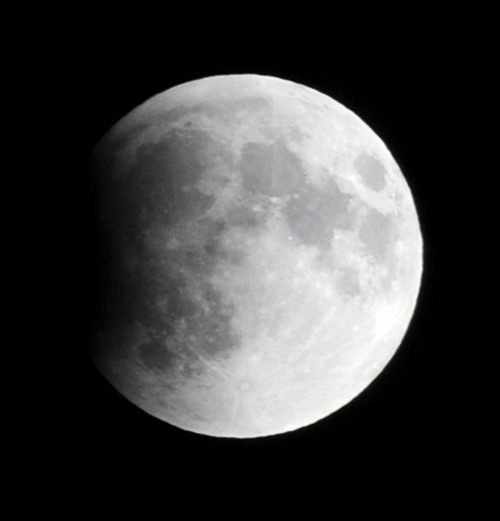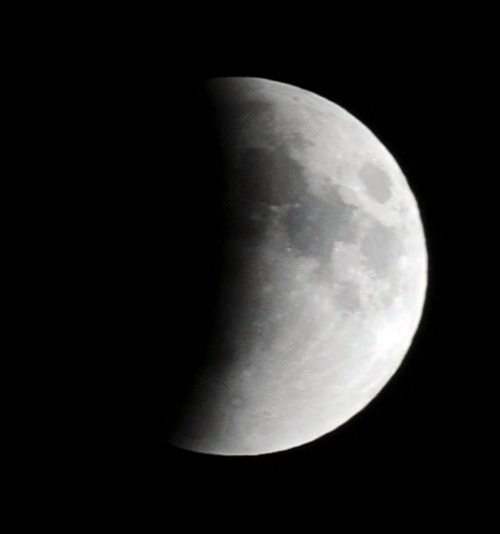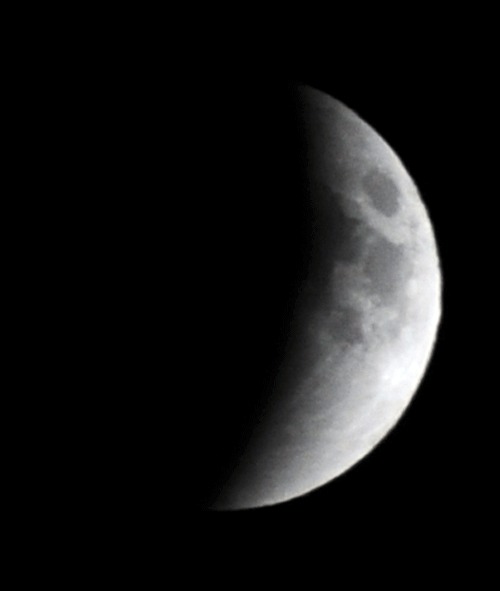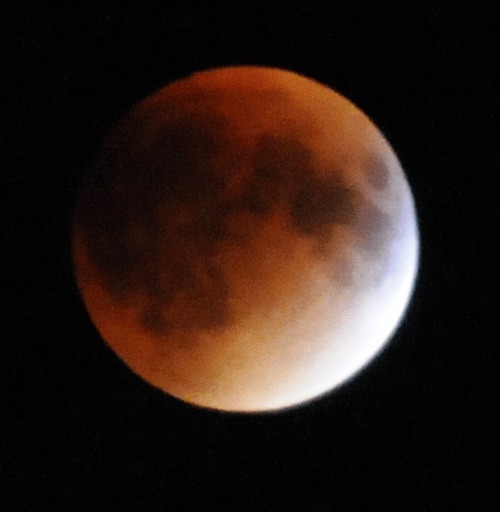MARTHA SEZ: Moonstruck at Norton Cemetery

News photo — Lou Reuter The shadow of the Earth gradually passes over a bright full moon during a lunar eclipse under clear skies Sunday night, Sept. 27.
Sunday night, Sept. 27, I kept going outside to the field behind my apartment building to check on the moon. Sunrise and moonrise are delayed here in Keene Valley. It takes time to climb above the mountains.
Each time I went out, Jupiter the cat got excited and ran along with me, intermittently hiding behind things and jumping out. He apparently thought it was pretty cool that I was visiting the field, which is a great place to find and obtain rodents.
Waiting for the moon, I ran into my neighbor Frank, who advised me to head up to Norton Cemetery where a group of stargazers was convening with telescopes and binoculars to watch the upcoming celestial event unfold. Good idea, I figured.
This was a rare occasion, a supermoon, when the moon is closest to the earth, making it loom larger than usual in the night sky, coupled with a complete lunar eclipse. The phenomenon last occurred in 1982.
By the time the moon was finally up over the mountain it looked huge and brilliant indeed. Almost immediately I could see its outer edge was being shadowed. Eclipsed. I thought maybe Jupiter was regarding the moon, too, but if he had any observations, he didn’t let on.

News photo — Lou Reuter The shadow of the Earth gradually passes over a bright full moon during a lunar eclipse under clear skies Sunday night, Sept. 27.
The moon was so bright that I almost forgot to turn on my car lights. As I motored off to Norton Cemetery I made up explanations for why it took me so long to turn on the lights in case the vehicle behind me was a police car. Luckily it wasn’t.
When I got up the hill at Norton, I couldn’t see anyone else there. It reminded me of one of those British mystery shows where someone tells the victim that everyone is meeting at the old cemetery on the night of the eclipse, and then … But Frank is hardly the type to implicate anybody in a bizarre Agatha Christie plot. Pretty soon I saw the group.
People were there who understand and love astronomy. They were only too happy to share their knowledge and equipment. People were taking wonderful photographs of the ongoing eclipse. One woman showed me a magnificent shot she had taken with her cellphone, using electronic equipment that I can’t even describe, much less comprehend. It was a wonderful experience, and it made me glad, as I often am, that there are math and science people willing and able to observe and record and work at understanding these phenomena that the rest of us then can take credit for, saying, yes, when you stop and think about it, isn’t human intelligence amazing?
Even the Adirondack weather relented and gave us a clear, almost cloudless sky, along with temperatures that were relatively balmy, considering the time of year. The rain and approaching cold front held off for a day. The air was redolant with the scent of wild creeping thyme crushed underfoot.
People gathered on the hill talked about the recently announced NASA discovery of flowing water on Mars. This is a huge breakthrough.

News photo — Lou Reuter The shadow of the Earth gradually passes over a bright full moon during a lunar eclipse under clear skies Sunday night, Sept. 27.
At the time of the NASA Viking 1 spacecraft Mars landing, scientists believed the planet was dead, an arid desert. Although 3.5 billion years ago Mars had an atmosphere similar to Earth’s, as well as salty seas that covered two-thirds of its northern hemisphere, and probably ice-capped mountains, it lost its atmosphere at some point and, with it, its oceans.
Now, orbiting and surface craft – including the Curiosity rover, which is rolling along over the red planet – have delivered data that reveal Mars has briny surface water in certain areas during the Martian summer, when the sun is strongest. The salts contained in the water keep it liquid at frigid temperatures, in the same way road salt melts the ice on state Route 73.
On Sept. 28, 2015, Luju Ojha, a doctoral candidate at Georgia Tech, published an article about the water on Mars in the scientific journal Nature Geoscience. I advise going to the NASA online site.
Humans will be traveling to Mars to learn more. I hope this will happen in my lifetime. There is so much in the universe we want to know. Even scientists ask: Was there ever/Is there now life on Mars? How does life start? Are we alone?
Meanwhile, we are mostly absorbed in our everyday lives, tending our gardens, minding the shop, plowing snow, doing the laundry, catching mice, here on our own beautiful planet.

News photo — Lou Reuter The moon turns orange during a lunar eclipse under clear skies Sunday night, Sept. 27.
Have a good week.
- News photo — Lou Reuter The shadow of the Earth gradually passes over a bright full moon during a lunar eclipse under clear skies Sunday night, Sept. 27.
- News photo — Lou Reuter The shadow of the Earth gradually passes over a bright full moon during a lunar eclipse under clear skies Sunday night, Sept. 27.
- News photo — Lou Reuter The shadow of the Earth gradually passes over a bright full moon during a lunar eclipse under clear skies Sunday night, Sept. 27.
- News photo — Lou Reuter The moon turns orange during a lunar eclipse under clear skies Sunday night, Sept. 27.





